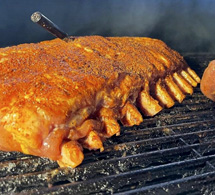Smart Food Probes' Impact on the Environment: Are They Worth It?

As technology continues to advance, smart food probes have become a revolutionary tool in the world of food safety and management. Equipped with sensors and artificial intelligence, these devices help monitor the freshness, quality, and safety of food. But with the rise of these high-tech solutions, it's crucial to examine their impact on the environment.
Are smart food probes a step towards a more sustainable future, or do they come with their own set of environmental challenges? In this article, we'll take a deep dive into the environmental impact of smart food probes and assess whether they're truly worth their ecological footprint.
What are Smart Food Probes?
Smart food probes are advanced devices designed to monitor every aspect of food. They use sensors and artificial intelligence to detect spoilage, contamination, and freshness. Some models can analyze temperature, humidity, and even chemical changes to ensure food safety and quality.
How do Wireless Food Thermometers Work?
These probes typically work by integrating sensors with connectivity options like Bluetooth or Wi-Fi. They continuously collect data about the food and forward it to a connected device, such as a smartphone or computer. This real-time information enables users to make informed decisions about the storage and consumption of food.
Environmental Benefits of Smart Food Thermometers
Reduce Food Waste
One of the main environmental benefits of smart food probes is their ability to reduce food waste. By monitoring food freshness and quality, these devices help prevent discarding edible food that has not yet spoiled. Reducing food waste can have significant environmental benefits, including reducing methane emissions from landfills and lowering the overall carbon footprint.
Optimizing Food Storage
Smart food probes can optimize food storage by ensuring that food is kept at the proper temperature and humidity levels. Proper storage can reduce food spoilage and extend the shelf life of food, which can help reduce waste and use resources more efficiently.
Supporting Sustainable Practices
By providing accurate data on the condition of food, smart food probes support sustainable practices in both home and commercial settings. For example, they can help businesses manage inventory more effectively, reduce the need for overproduction, and minimize waste.
Environmental Challenges of Smart Food Probes
E-Waste
One of the significant environmental challenges posed by smart food probes is electronic waste. These devices, like other electronic products, have a limited lifespan and can contribute to the electronic waste problem if not properly disposed of or recycled. The production and processing of electronic devices also involve the extraction of raw materials and the emission of pollutants.
Energy Consumption
Smart food probes require energy to operate, which can have an impact on the environment. While these devices are generally low-powered, the cumulative effect of using many of these devices can result in increased energy consumption. The energy efficiency of these devices and their long-term impacts must be considered.
Resource Use
The production of smart food probes requires the use of a variety of resources, including metals, plastics, and other materials. The extraction and processing of these materials can have environmental impacts, such as habitat destruction and pollution. It is critical to evaluate the resource efficiency and sustainability of these devices.
Weighing the Pros and Cons
Balancing Environmental Impacts
To determine whether smart food probes are worth the environmental impact, the pros and cons must be weighed. Reducing food waste and optimizing food storage can bring significant environmental benefits, but these must be balanced with issues of e-waste, energy consumption, and resource use.
Sustainable Practices and Innovation
Many manufacturers are working to address the environmental challenges associated with smart food probes. Innovations such as recyclable materials, energy-efficient designs, and improved e-waste recycling programs can help mitigate some of the negative impacts. Supporting companies that prioritize sustainability can make a difference.
Conclusion
Smart food probes offer considerable advantages in reducing food waste and optimizing food storage, and can make positive contributions to the environment. However, they also bring challenges related to e-waste, energy consumption, and resource use. By considering these factors and supporting sustainable practices and innovations, environmental benefits can be maximized while minimizing drawbacks. Ultimately, the decision to use a smart food probe should be based on a balanced understanding of its environmental impact and its potential to contribute to a more sustainable future.
The above is a brief introduction to the environmental impact of wireless food probes. If you want to learn more about smart food probes or order smart food thermometers, please contact us.
With twenty years of professional experience in this field, GrillMeater is a leading professional wireless cooking probe manufacturer committed to the continuous development and production of cutting-edge food temperature measurement equipment. Throughout its development process, GrillMeater has accumulated rich experience and positioned itself as a leader in temperature network sensing and precision management technology.
GrillMeater smart cooking probes serve a diverse range of customers, including Fortune 500 companies and the Chinese Academy of Sciences, as well as professional medical institutions such as the Navy Professional Medical Center. GrillMeater products are widely used in a variety of environments, including homes, restaurants, hotels, food processing facilities, and the kitchen appliance industry, embodying reliability, innovation and versatility, and improving the efficiency and precision of many cooking tasks.
FAQ for Wireless Food Thermometer
1. How do smart food probes help reduce food waste?
Smart food probes monitor the freshness and quality of food, allowing you to use or eat food before it spoils, thus reducing unnecessary waste.
2. What are the main environmental issues associated with smart food probes?
The main issues include electronic waste, energy consumption, and resource use during the manufacturing process. Proper disposal and energy-saving design can help alleviate these issues.
3. Are there environmentally friendly alternatives to traditional smart food probes?
Yes, some manufacturers focus on using recyclable materials, energy-saving technologies, and sustainable production practices to create more environmentally friendly options.
4. How do I properly dispose of or recycle my smart food probe?
Check with your local e-waste recycling program or manufacturer recycling program to ensure proper disposal. Many electronics retailers also offer recycling services.
5. Does a smart food probe require a lot of energy to operate?
Smart food probes generally use less energy, but the cumulative effect of many devices can add up. Choose an energy-efficient model to minimize the impact.













